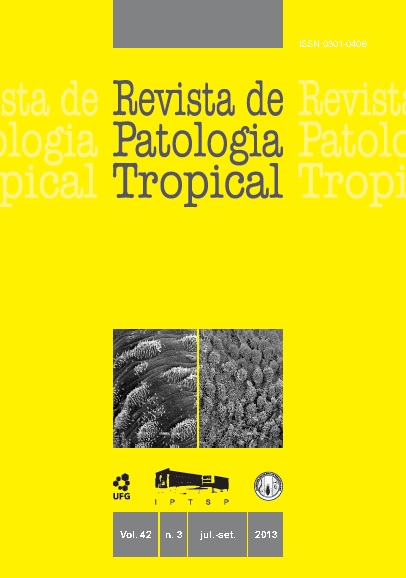FREQUÊNCIA DE PARASITOS EM ALFACES (Lactuca sativa) CONSUMIDAS EM RESTAURANTES self-service DE PORTO ALEGRE, RIO GRANDE DO SUL, BRASIL
DOI:
https://doi.org/10.5216/rpt.v42i3.26926Palavras-chave:
Nematódeos, Artrópodes, Protozoários, Higienização, HortaliçasResumo
O consumo de vegetais frescos é uma via de infecção por enteroparasitos. Vários trabalhos constataram a contaminação de hortaliças destinadas ao consumo de seres humanos. Este estudo avaliou os procedimentos de higienização e a presença de estruturas parasitárias e/ou sujidades em alfaces servidas em restaurantes self-service de Porto Alegre-RS. Foram analisadas, pelo método de sedimentação espontânea, 90 amostras de alface (45 antes e 45 após a higienização), provenientes de 15 restaurantes. Cada amostra, constituída por 20 a 25 folhas grandes de alface, foi separada e embalada em sacos plásticos de primeiro uso pelo funcionário responsável pela higienização em cada estabelecimento. Os procedimentos de higienização dos estabelecimentos participantes foram avaliados por meio de questionário epidemiológico. Foram encontradas larvas e adultos de nematódeos de vida livre (21/45) e fragmentos de insetos (17/45) nas amostras não higienizadas e, naquelas prontas para consumo, fragmentos de insetos (7/45) e oocistos não esporulados (3/45). Sanitizantes à base de cloro eram os mais utilizados pelos restaurantes (10/15), mas três estabelecimentos utilizavam apenas água corrente. Embora nenhuma estrutura parasitária patogênica tenha sido identificada, concluiu-se que as medidas de higienização adotadas na sanitização das hortaliças foram pouco eficientes, pois 20% (9/45) das amostras de alface apresentaram falhas no processo de higienização.Downloads
Downloads
Como Citar
Edição
Seção
Licença
The manuscript submission must be accompanied by a letter signed by all authors stating their full name and email address, confirming that the manuscript or part of it has not been published or is under consideration for publication elsewhere, and agreeing to transfer copyright in all media and formats for Journal of Tropical Pathology.

